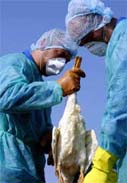France reports first case of H5 bird flu; lethal H5N1 suspected
The H5 subtype of bird flu was found in a dead wild duck in France, and the government said Friday it was almost certainly the lethal H5N1 strain.

If confirmed as H5N1, it would be France's first case of the disease that has swept from Asia to Europe and Africa and raised fears of a worldwide flu pandemic if it mutates into a form that is easily transmitted between humans.
The Agriculture Ministry said the H5 avian flu subtype detected in the duck had "strong similarities" with the Asian H5N1 strain. Follow-up tests to confirm whether it was H5N1 were being conducted, with results not expected before Saturday.
Agriculture Minister Dominique Bussereau told reporters Friday night that there was a 90 percent chance that it was H5N1, adding that he expected confirmation over the weekend. He spoke after a ministerial meeting on the issue called by Prime Minister Dominique de Villepin.
France, the European Union's leading poultry producer, is already on alert to try to ensure that avian flu does not spread from the wild, where the disease is not unusual, to its 200,000 farms that raise 900 million chickens, turkeys, ducks and other birds each year.
That just days passed between when the duck was found and the announcement that it had H5 was seen as a measure of the effectiveness of French surveillance and testing procedures.
"French authorities should be encouraged for reporting this so quickly and this allows them, as well as local farmers, to take extra monitoring precautions," Alex Thiermann, an expert for the World Organization for Animal Health in Paris, said in a telephone interview.
The suspected case of H5N1 was reported two days after France announced new anti-bird flu measures, ordering all poultry to be either vaccinated or confined indoors.
In line with new EU anti-bird flu measures adopted Friday by the European Commission, a 3-kilometer (2-mile) protection zone was in force around the spot where the duck was found in a bird reserve on the Dombes plateau, some 30 kilometers (20 miles) northeast of Lyon, France's third-largest city.
Veterinarians were systematically checking poultry in the zone, the movement of live poultry to and from the area was banned, and wild birds also were being watched more closely, the ministry said.
The Dombes plateau has about 1,000 lakes and is a favored stop-off for migrating birds.
The diseased bird was one of seven dead ducks found on a lake last weekend and handed over Monday to a laboratory, Catherine Dupuis, the local director of veterinary services, told the AP.
O.Ch.
Subscribe to Pravda.Ru Telegram channel, Facebook, RSS!





